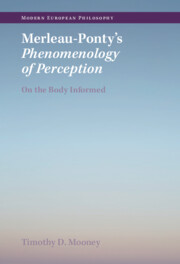Book contents
- Merleau-Ponty’s Phenomenology of Perception
- Modern European Philosophy
- Merleau-Ponty’s Phenomenology of Perception
- Copyright page
- Contents
- Acknowledgements
- Abbreviations
- Preface
- Chapter 1 Phenomenology and Objective Thought
- Chapter 2 Sensations, Associations and Explanations
- Chapter 3 Attention, Judgement and Other Work
- Chapter 4 Back to the Experience of the Body
- Chapter 5 The Body Schema and Our Skills
- Chapter 6 Motor Intentionality and Our Landscapes
- Chapter 7 Others Expressive, Engaged and Exposed
- Chapter 8 Language, Speech and Affectivity
- Chapter 9 Temporality, Subjectivity and Idealisation
- Bibliography
- Index
Chapter 9 - Temporality, Subjectivity and Idealisation
Published online by Cambridge University Press: 03 November 2022
- Merleau-Ponty’s Phenomenology of Perception
- Modern European Philosophy
- Merleau-Ponty’s Phenomenology of Perception
- Copyright page
- Contents
- Acknowledgements
- Abbreviations
- Preface
- Chapter 1 Phenomenology and Objective Thought
- Chapter 2 Sensations, Associations and Explanations
- Chapter 3 Attention, Judgement and Other Work
- Chapter 4 Back to the Experience of the Body
- Chapter 5 The Body Schema and Our Skills
- Chapter 6 Motor Intentionality and Our Landscapes
- Chapter 7 Others Expressive, Engaged and Exposed
- Chapter 8 Language, Speech and Affectivity
- Chapter 9 Temporality, Subjectivity and Idealisation
- Bibliography
- Index
Summary
I outline the theories of temporal awareness and existential temporality that Merleau-Ponty gets from Husserl and Heidegger and qualifies with his account of body temporality. This constitutes an efficacious past that inhabits the present without ever having been present to consciousness. I then set out his stories about the tacit and spoken cogito and about the concrete subject or person. I consider objections to the effect that his account of the embodied subject seems to cast it as an unceasing project of acquisitive appropriation, and that his view of the body is an idealisation from an ageist and ableist perspective. My response is that his story about appropriation is qualified for the most part, and that his theory can be reworked to escape the charges of idealisation, ageism and ableism. I conclude by suggesting that his notion of radical reflection brings out how phenomenology is of its essence revisable and its futures unforeseeable.
- Type
- Chapter
- Information
- Merleau-Ponty's Phenomenology of PerceptionOn the Body Informed, pp. 206 - 232Publisher: Cambridge University PressPrint publication year: 2022

